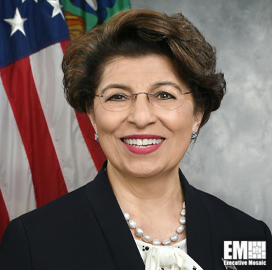
Jovita Carranza, administrator of the U.S. Small Business Administration, has launched the $349B Paycheck Protection Program, an emergency loan program created last week with the President’s signing of the Coronavirus Aid, Relief, and Economic Security Act, the SBA announced on Monday.
“These loans will bring immediate economic relief and eight weeks of financial certainty to millions of small businesses and their employees,” Carranza said. “We urge every struggling small business to take advantage of this unprecedented federal resource – their viability is critically important to their employees, their community, and the country.”
The program will provide forgivable loans up to $10 million to small businesses left financially distressed by the Coronavirus (COVID-19) pandemic. The loans will be administered at the local level by a national network of banks and credit unions and are designed to maintain the viability of millions of small businesses struggling to meet payroll and day-to-day operating expenses.
The loans will be 100 percent backed by SBA and will be provided to small businesses without collateral requirements, personal guarantees, SBA fees, or credit elsewhere tests. Those eligible for the program include small businesses, certain non-profits, veterans’ organizations, self-employed individuals, independent contractors and other businesses meeting size standards based on their North American Industry Classification System code.
The Paycheck Protection Program’s maximum loan amount is $10 million with a fixed 1 percent interest rate and maturity of two years. The loans will be available to cover up to eight weeks of average monthly payroll, based on 2019 figures, plus 25 percent and payments are deferred for six months.
The SBA will forgive the portion of loan proceeds used for payroll costs and other designated operating expenses for up to eight weeks, provided at least 75 percent of loan proceeds are used for payroll costs.
“Following the passage of the emergency economic relief assistance, the Administration and Congress acted to ensure that small businesses and nonprofits alike have access to critical funds to keep their workers paid and employed,” said Carranza. “Faith-based organizations have always provided critical social services for people in need, and SBA will make clear that these organizations may access this emergency capital.”
Carranza also noted that all faith-based organizations impacted by Coronavirus (COVID-19) are eligible to participate in the Paycheck Protection Program and the Economic Injury Disaster Loan program, without restrictions based on their religious identity or activities, to the extent they meet the eligibility criteria outlined in the CARES Act and implemented by the Paycheck Protection Act Interim Final Rule.
The Economic Injury Disaster Loan program provides qualifying small businesses and nonprofits with working capital up to $2 million with low interest rates and terms extending up to 30 years.
“While every American is being affected by COVID-19, the impact of this pandemic is particularly hurting our schools and places of worship, and disproportionately impacting the underrepresented communities, the sick, the elderly and the lower income,” added Carranza. “It’s vitally important that organizations focused on delivering critical social services and meeting community needs remain viable, particularly during this economically challenging time.”
About the U.S. Small Business Administration
The U.S. Small Business Administration makes the American dream of business ownership a reality. As the only go-to resource and voice for small businesses backed by the strength of the federal government, the SBA empowers entrepreneurs and small business owners with the resources and support they need to start, grow or expand their businesses, or recover from a declared disaster. It delivers services through an extensive network of SBA field offices and partnerships with public and private organizations.





